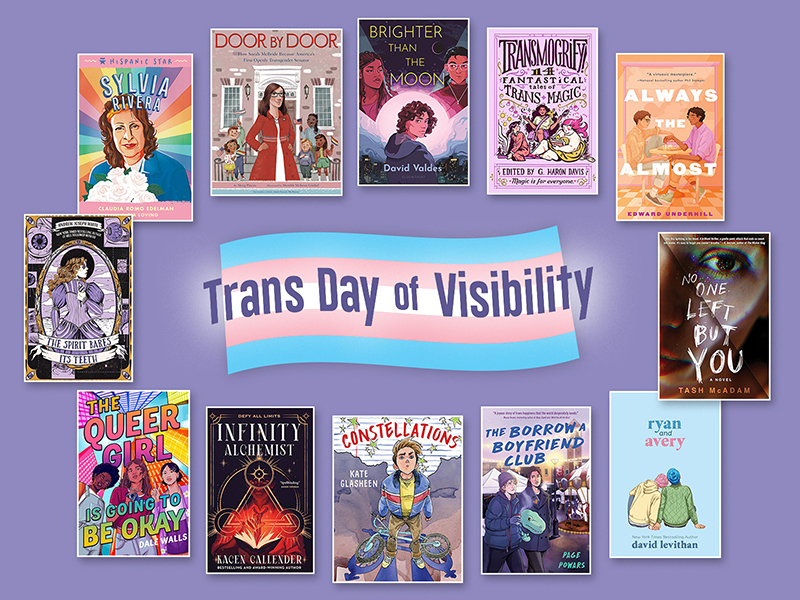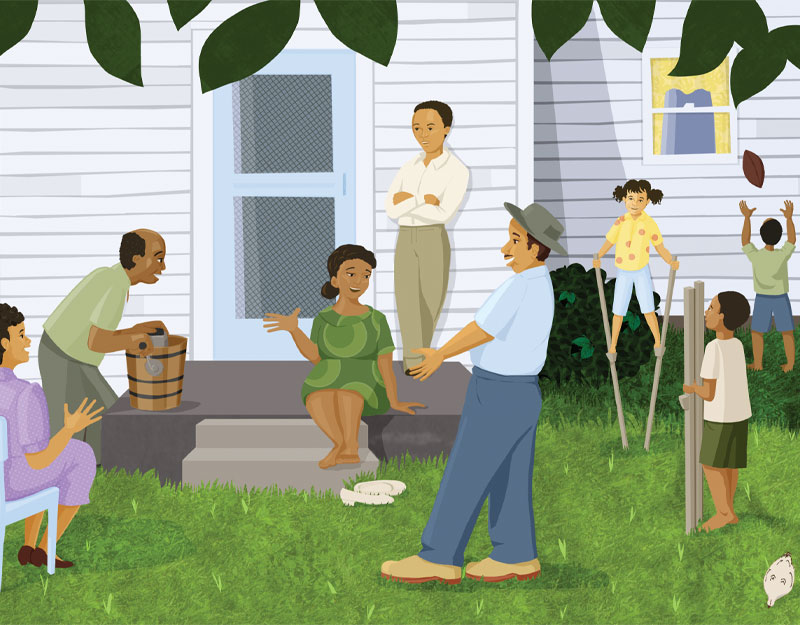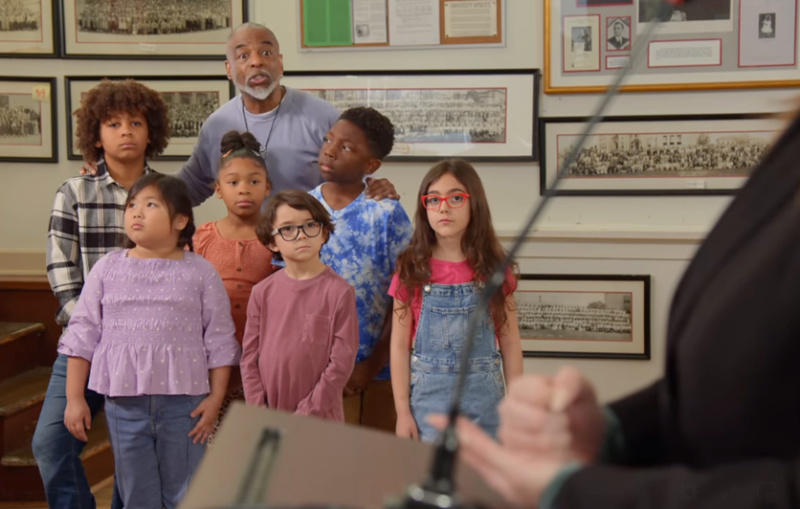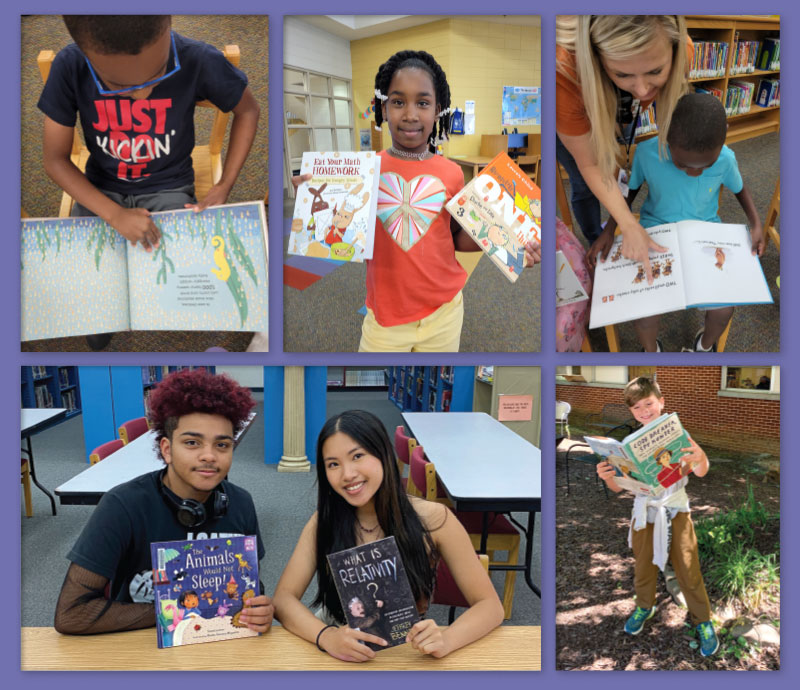Review of the Day: Hi, Koo!: A Year of Seasons by Jon J. Muth
 Hi, Koo! A Year of Seasons
Hi, Koo! A Year of Seasons
By Jon J. Muth
Scholastic
$17.99
ISBN: 978-0-545-16668-3
Ages 4-8
On shelves February 25th
I have a colleague who is mighty careful when regarding haiku. She’s Japanese-American herself, and one thing she simply cannot stand is when someone takes a set of words, slaps them into five/seven/five syllable lines, and then calls the result “a haiku”. Traditional haiku focuses on nature and how we, as humans, relate to it. So what happens when 5/7/5 gets taken out of the equation entirely? Author/illustrator Jon J. Muth is no stranger to children’s picture books that challenge the reader. And though he’s written many a book touching on the concept of “Zen”, straight up poetry has rarely been his bag. All that changes with the publication of Hi, Koo!: A Year of Seasons. Gutsy in its quiet, contemplative way, Muth doesn’t follow the same old, same old poetry model. Maybe that’s part of the reason I like it so very much.
Twenty-six haikus spotlight four different seasons. In the book, a panda cub named Koo and two human siblings explore fall, winter, spring and autumn in a myriad of different ways. From a snowball on a stop sign (“are we in trouble?”) to act of accidentally killing a bug (“afterward / feeling alone and Sad”) the haikus do double duty as both poems and, depending on which word is capitalized, a tour of the alphabet. Inspired by his own young twins, Muth, with seeming effortlessness, brings to young readers a fellow traveler.
ADVERTISEMENT
ADVERTISEMENT
Poetry is dead. I’m sorry. That sounds a bit bleak. Allow me to rephrase that sentence. Poetry for children is dead. Nope . . . nope that still sounds bleak, doesn’t it? Well it’s not true anyway . . . yet. But you see I’ve been watching the number of works of poetry published for kids the last few years and I swear that each season we get fewer and fewer and fewer. I believe a combination of different factors is to blame. On the one hand, poetry doesn’t hold a spot of honor in some curriculum anymore and it’s not every school that has their kids memorize a whole poem these days. Add in the fact that the American Library Association presents no official award for a work of children’s poetry and the fact that a GOOD book of poetry is insanely hard to write and you’ve a decrease in the number being published every year. So imagine my relief when I discovered that Muth had thrown his hat in the ring. Haiku? I’ll take it! Whatever you’ve got, man. Lay it on me.
Not that I was initially on board with the come-as-you-are attitude towards syllables in this book. Not at first. It took a careful reading of Muth’s Author’s Note (which thankfully is the first thing you read in the book) before I truly understood what was going on. As he explains, the original Japanese haiku is made of seventeen sound parts called “on”. But English syllables and “on” aren’t equivalent to one another. “Over time, haiku has evolved, so that many modern poets no longer adhere so rigidly to this structure.” Taking his cue, Muth strives to capture sensory images in his poems. “At its best, a haiku embodies a moment of emotion that reminds us that our own human nature is not separate from all of nature.” And heck, it’s not even as if Muth is the first guy in the world to ignore the now standard English syllabic scheme. Poet Harold G. Henderson went so far as to make his haikus rhyme. How’s that for originality?
Does that mean that the book will have limited use in schools? Yeah, well maybe, but enterprising teachers will still find it to be amongst the best there are. Plus, as I say, it’s not like poetry’s getting as much play as it deserves these days. If the teacher insists on 5/7/5, there are lots of other books out there to choose from. And there may be objections even still from folks who adhere to the original definition of what a Haiku constitutes. For some, Haiku is a kind of basis for mediation as it applies to Zen philosophy. Yet even there, Muth tips his hat. Note the final page. There, in the dying twilight of a summer night, seated on a tree branch with a cardinal’s nest perched on his head, we hear Koo’s final poem. “becoming so quiet / Zero sound / only breath.” As Haikus for kids go, this is as Zen as it gets.
So let’s ask the million-dollar question here. If Muth knows his Haiku history, does he follow its form? Which is to say, does each poem that he writes discuss nature or the seasons and how they relate to kids? Well, yes and no. With a regular cast of characters, these haikus tell a story together. One such poem reads, “Friend, is that you / knocking at the door? / TWO!” Look at the image and you see two heavily bundled kiddos standing outside Koo’s door, eager for him to play with them in the wintery white. Can an illustration play a part in conveying a seasonal aspect of a poem when the words in the poem itself do not? No idea, but if so then Muth’s in the clear.
Though it’s beautiful from start to finish, I think I should probably point out that this is a really fun, funny, amusing, infinitely readable book as well. My own copy was sitting on my dining room table when my two-year-old spotted it and started insisting I read her “the picture book”. I did and she got a real kick out of it (though the image of eyes gone square from too much TV kind of gave her the jim jams). As someone who purchases books for my library system it made me a little sad that I’ll be cataloging this book in the poetry section and not the picture book section. Sitting next to fellow Muth creations Zen Ties, Zen Shorts and Zen Ghosts I’d be able to guarantee its circulation. In poetry it’ll be a harder sell, but I’m willing to put it there if it lures Muth fans to the world of poem and verse.
When a form of poetry is also a form of philosophy, you are naturally going to have some folks a bit peeved by its appropriation. By the same token, appropriation is the nature of art in America. I think perhaps it will be more likely that certain gatekeepers (teachers, parents, librarians, etc.) will find Muth’s refusal to toe the line and go 5/7/5 with his syllables far more of an annoyance. Consider the man’s justifications and ask yourself what truly is more important in a haiku. Is it form or is it feeling? April is Poetry Month and in an era of blackout poems, spine poetry, reversos, and whatever it is Bob Raczka was doing in Lemonade (is there even a term for it?) we can afford to shake things up for our kids a little. Give haiku back its gravitas, and give your kids a book that also happens to be really fun (not to mention beautiful) as well.
On shelves February 25th.
Source: Galley sent from publisher for review.
Like This? Then Try:
- Guyku by Bob Raczka, ill. Peter Reynolds
- Seasons by Charlotte Zolotow
- Red Sings From Treetops by Joyce Sidman
- Firefly July by Paul B. Janeczko, ill. Melissa Sweet
Other Blog Reviews: Mundie Kids
Professional Reviews:
- A star from Kirkus
- A star from Publishers Weekly
Misc: It’s Poetry Friday, you lovely lads and lasses! Head on over to No Water River for the round-up.
Filed under: Best Books, Best Books of 2014, Reviews, Reviews 2014
About Betsy Bird
Betsy Bird is currently the Collection Development Manager of the Evanston Public Library system and a former Materials Specialist for New York Public Library. She has served on Newbery, written for Horn Book, and has done other lovely little things that she'd love to tell you about but that she's sure you'd find more interesting to hear of in person. Her opinions are her own and do not reflect those of EPL, SLJ, or any of the other acronyms you might be able to name. Follow her on Twitter: @fuseeight.
ADVERTISEMENT
ADVERTISEMENT
SLJ Blog Network
One Star Review, Guess Who? (#202)
Exclusive: Giant Magical Otters Invade New Hex Vet Graphic Novel | News
Parsing Religion in Public Schools
Take Five: LGBTQIA+ Middle Grade Novels
ADVERTISEMENT









Ooh, I sure hope you’re wrong about poetry being dead, Elizabeth! As a Cybils poetry award judge immersed in evaluating high-quality poetry collections, it seems hard (and infinitely sad) to believe that such beauty is destined for a dusty shelf. What can we do that we’re not doing?
I love Muth’s other books, and this one sounds just as delightful. Thank you!
I don’t really think it’s dead yet, but if we continue in the way that we’re going it may well end up forgotten. We need a new push in some way. An ALA Award . . . well that would do wonders. In lieu of that, it’s up to parents and teachers to a certain extent. Dunno. I need to do a strategic look at what the years produce, but I can tell you right now that it is NOT a lot.
Betsy, thank you for this thoughtful review, overview, and challenge.
Sylvia Vardell has posted her ongoing list of children’s poetry titles coming out in 2014 – thirty-seven so far. Perhaps all is not lost! http://poetryforchildren.blogspot.it/2014/01/sneak-peek-2014.html
Ye gods! This is a gold mine! Thank you so much for linking to it, Renee!
Come to my classroom sometime!
There’s a reason you served as the poetic inspiration in Nikki Grimes’s Words with Wings, Ed!
I know what you mean with poetry. I used to have every class in my rotating roster in for a poetry unit in April. Now more than half the teachers have cut out poetry for extra nonfiction topics.
She has these sneak peek lists going back to 2010 (which had 65 books on it) – a gold mine, indeed! Here are the rest: http://poetryforchildren.blogspot.it/2014/01/sneak-peek-2014.html#uds-search-results
A few years ago, at the National Book Festival in DC, Muth talked about a fourth Stillwater book to round out the seasons. I believe he said it would be called Zen Snows or something similar. He even drew Stillwater sledding in an inner-tube. I was so hoping this was going to be that book, but I’m sure this book will also be great.
A little bird told me about a wonderful book.
I sat and read
So many reviews
And this one true
I’m not sure we need another ALA award. What we need is a greater awareness of the existing poetry awards: the Lee Bennett Hopkins Poetry Award, the Lion and the Unicorn Poetry Award, and the Claudia Lewis Poetry Award.
Yep, agree that those awards need some additional (read: ANY!) attention. But does it not strike you as really very odd that poetry, of all things, gets short shrift from an official librarian organization? One would thing they’d be all over that form, and yet we know this is not the case.